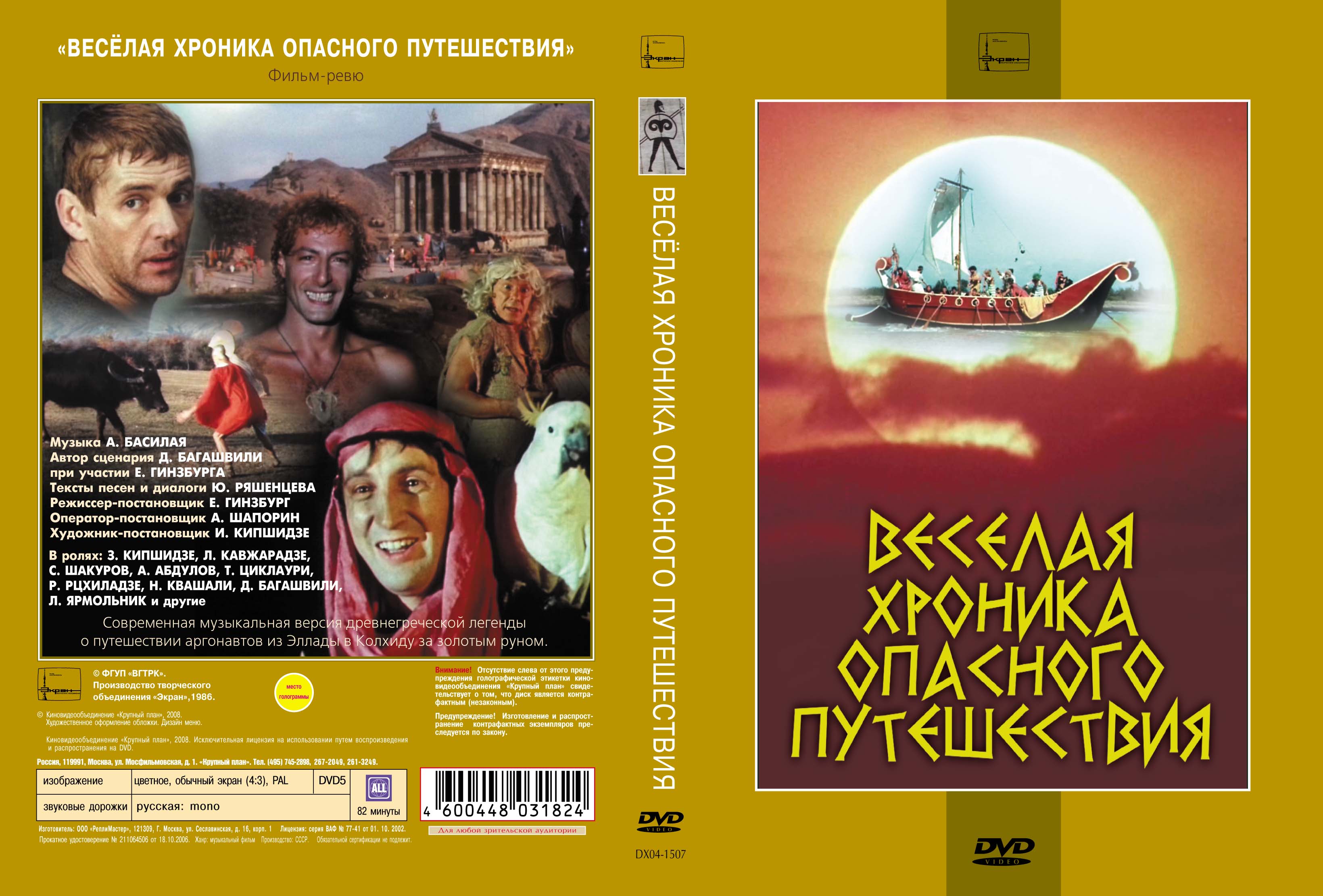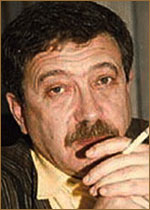Title of the work
Studio / Production Company
Country of the First Edition
Country/countries of popularity
Original Language
First Edition Date
First Edition Details
Веселая хроника опасного путешествия [Merry Chronicle of a Dangerous Voyage (Vesёlaia khronika opasnogo puteshestviia)]. Directed by E. Ginzburg. Script by J. Bagashvili and E. Ginzburg. Composer and songwriter A. Basilaia. Music performed by VIA Iberia. Moscow: TO Ekran, 1986. 81 min.
Running time
Date of the First DVD or VHS
Available Onllne
The movie is available on YouTube (accessed: February 21, 2019).
Genre
Motion picture
Musicals
Target Audience
Young adults (Movie databases define it as a 6+ film, however in my opinion it is addressed to a young adult and adult audience (I would assess it as a 14+ movie). )
Cover

Courtesy of the Film Video Association “Крупный план” [Close-up (Krupnyĭ plan)] close-up.ru, (accessed: August 17, 2018).
Author of the Entry:
Hanna Paulouskaya, University of Warsaw, hannapa@al.uw.edu.pl
Peer-reviewer of the Entry:
Elżbieta Olechowska, University of Warsaw, elzbieta.olechowska@gmail.com
Susan Deacy, University of Roehampton, s.deacy@roehampton.ac.uk

Jemal Bagashvili (Scriptwriter)

Aleksander Basilaia
, 1942 - 2009
(Author of lyrics, Composer)
Aleksander Basilaia (ალექსანდრე ბასილაია, Александр Басилая) was a Georgian composer and songwriter of popular music, art director of VIA Iveria. He was awarded the title of Honoured Artist of Georgia.
VIA Iveria was a musical and instrumental ensemble named in honour of an ancient Georgian kingdom. It was popular all over the USSR for its pop, jazz and rock compositions with motives of Georgian folk music.
Bio prepared by Hanna Paulouskaya, University of Warsaw, hannapa@al.uw.edu.pl

Portrait of E. Ginzburg, courtesy of kino-teatr.ru database (accessed: July 2, 2018).
Evgeny Ginzburg
, 1945 - 2012
(Director)
Evgeny Ginzburg (Евгений Гинзбург) was a Russian film and television director, especially known for his musicals. He was awarded a Rose d’Argent at the International TV Festival in Montreux (Switzerland) for three of his movies, and received a TEFI (Russian annual award given for achievements in Russian TV industry) for his personal contribution to the development of Russian television.
Born in Chelyabinsk to an actress and a theatre director, he studied stage direction in Tashkent and Tbilisi. He directed many musical shows for the Central Television of the USSR in Moscow. His best known program was called Benefis (Benefit Performance) and was broadcast in 1974–1980 and 1993. He directed two TV films in Georgia, one being Argonavtebi [The Argonauts].
Bio prepared by Hanna Paulouskaya, University of Warsaw, hannapa@al.uw.edu.pl
Casting
Main actors:
- Zurab Kipshidze (1953– ) – Jason,
- Lika Kavjaradze (1959–2017) – Medea,
- Sergei Shakurov (1942– ) – Pelias, Diogenes, Phineus,
- Aleksandr Abdulov (1953–2008) – Shalom,
- Roman Rtskhiladze – Heracles,
- Teimuraz Tsiklauri (1946– ) – Aeëtes.
Summary
The movie presents the myth of the Argonauts in contemporary setting. It starts with an introduction about Tim Severin’s expedition to Georgia in 1984 and then presents the director’s version of the myth. The movie contains most of the main elements of the classical myth. It tells briefly the story of Jason and Pelias, describes the building of “Argo” (which looks exactly like Tim Severin’s “Argo”) and the assembling of the team. Then it presents adventures of the Argonauts on the sea (the island of the Bebrycians with king Amykos [Apol. Rhod., Argonautica, 2. 1–150], Lemnos presented as an island of the Amazons [Apol. Rhod., Argonautica, 1. 607–912], meeting a prophet Phineus transformed into a harpy [Apol. Rhod., Argonautica, 2. 178–533], meeting the sirens [Apol. Rhod., Argonautica, 4. 891–921]) and in Colchis. As the movie is a musical, every element is present as a short musical sketch, often with dances and comic elements.
This version of the myth eliminates drastic cruelty. There are predictions of future dangers in the plot, but all of them appear less ominous (except a rockfall in the mountains and a sea storm). The fight with Bebrycians is a jam-session held by Heracles and Amykos. The “sacred” Golden Fleece turns out to be a parchment with Georgian wisdom given to Jason as Medea’s dowry. Jason and Medea fall in love and Aeëtes blesses them. Jason has to harness a bull, plow a field, wait for the harvest (grapes that grow on the field sown by Jason!), but there are no dragon’s teeth, no army, and, even, no dragon. These elements of the myth are implied to be a nightmare of young men drunk on Georgian wine.
There are also some elements added to the myth. For example, before the journey Jason goes for advice to a Greek philosopher Diogenes. On the first island, where the Argonauts land, they meet young boys on the shore, who want the heroes to move them to laughter, which is a typical motive in Georgian folklore. One of the Argonauts is Shalom, a Georgian returning home. In Colchis Jason participates in a contest of suitors for Medea and wins her favour.
Analysis
In 1984, the expedition of Tim Severin reconstructing the voyage of Jason reached the shores of Soviet Georgia. The movie declares itself to be also a research exercise aiming to explore “why the Argonauts sailed to the edge of the world, as it seemed then”. The film presents the myth from the point of view of modern young men and their desire to have fun and adventures. The Argonauts look like young men on vacations, whose problems disappear the next morning. The movie is full of cheerful songs and creates a light, joyful atmosphere.
The plot of myth differs from the ancient versions. For example, contrary to the Argonautica, it is Heracles who becomes infatuated with the queen of Lemnos (called Lydia in this case). His song of love to her reconciles women and men. Jason even tries to leave Heracles at the island to continue the travel. But the Argonauts return for him and proceed with the journey together. Thus, contrary to the Apollonius Rhodius’ version, Jason is not falling in love, nor abandoning pregnant Hypsipyle. Love of Heracles is true and faithful, he leaves the island taken by force by his friends. Thus, this version of the myth does not anticipate future infidelity of Jason to Medea.*
Colchis is depicted as the contemporary Georgia, famous for its hospitality, songs and food. Shalom, a Georgian member of the crew, tries (unsuccessfully) to convince his friends to bring peace to the country and forget about the Fleece. We see crowds of Georgians meeting the tourists with open arms. Even the Greek Argonauts speak with a Georgian accent and sing Georgian songs.
Medea is a kind, chaste young woman, versed in popular wisdom and fairytales of the country. As Shalom states: “not a witch, but a fairy […], a saint, she even brings dead people to life sometimes.” She is a smiling young lady with long hair, dressed in a hippie style long robe.
Jason is shown as a king’s son longing for power and a hero yearning for great deeds. However his words sound childish and unconvincing.
Aeëtes is a father giving his very young daughter into marriage, however, contrary to ancient representations of the myth, in the movie the king trusts his daughter and approves of her choice, there is no fight between Aeëtes and Jason. Aeëtes blesses his daughter and the Argonauts for their journey home and gives the parchment (the fleece) to the Greeks, however he misses his child.
The movie finishes on the return of the ship to the shores of departure showing cameramen, the crew and the actors in modern clothes. “Finish, finish the filming” are the last words of the movie.
* This element of myth is often omitted in children’s interpretation of the story as inappropriate for a young reader. See Lovatt, “Gutting the Argonautica?…”, 26–30.
Further Reading
Colavito, Jason, Jason and the Argonauts through the Ages. Jefferson, North Carolina: McFarland, 2014.
Lovatt, Helen, “Gutting the Argonautica? How to Make Jason and the Argonauts Suitable for Children”, in Dunstan Lowe and Kim Shahabudin, eds., Classic for All. Reworking Antiquity in Mass Culture, Newcastle upon Tyne: Cambridge Scholars Publishing, 2009, 17–38.
Profile at imdb.com (accessed: August 17, 2018).
Profile at kinopoisk.ru (accessed: August 17, 2018).
Profile at kino-teatr.ru (accessed: August 17, 2018).
Addenda
The Remaining Production Credits:
Cinematography by Aleksandr Shaporin;
Music and dances by VIA [Vocal-Music Instrumental-Ensemble ] “Iveria”.


